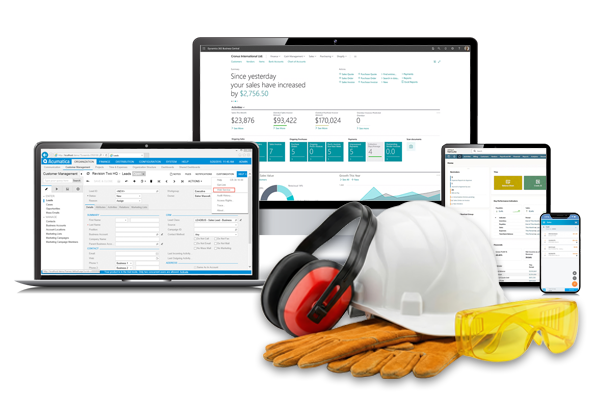COMPARISON | 4 MIN READ
Dynamics 365 Business Central vs. Finance and Operations
Compare the similarities and differences of these two Microsoft ERP solutions.

Microsoft’s Dynamics 365 Business Central and Dynamics 365 Finance and Supply Chain Management (formerly Finance & Operations) are two very similar ERP solutions with overlapping features and functions. While these solutions share a great deal, there are several key differences that may make one a better fit for your business than the other. In this article we will be comparing the similarities and differences. If you want a side-by-side report, unlock our Dynamics 365 Business Central vs. Finance and Operations Comparison Report.
Mid-Market vs. Enterprise
Features
Business Central Core Features:
- Finance Management
- Sales & Marketing
- Sales & Delivery
- Purchasing & Payables
- Inventory
- Supply Planning & Availability
- Project Management
- Warehouse Management
Finance and Operations Core Features:
- Accounts Payable
- Accounts Receivable
- Budgeting
- Cash and Bank Management
- Cost Accounting
- Expense Management
- Financial Reporting
- Fixed Assets
- General Ledger
- Project Management and Accounting
- Public and Private Sectors
Suppose you’re eager to explore additional core and advanced module features offered by Business Central and Finance and Operations. In that case, our comparison report is the perfect resource for you. Explore a detailed side-by-side comparison report.
Pricing
Implementation Timeline
The amount of time needed to implement these solutions will be unique to your business depending on your needs, the modules you choose to implement, and any additional customizations or integrations that are part of your implementation project. Dynamics 365 Business Central typically takes between 3 to 6 months to implement. This timeline reflects its balance of robust functionality and streamlined setup, making it a solid option for mid-sized businesses looking for faster deployment with room to scale.
Dynamics 365 Finance & Supply Chain Management, by contrast, is built for larger organizations with more complex requirements, which often results in a longer implementation cycle. Most projects take between 4 to 7 months to go live, especially when global operations, advanced financial structures, or deep industry customizations are involved. While the implementation takes more time, it ensures that enterprise businesses get a system tailored to their workflows, compliance requirements, and performance goals.
Integrations
Both Business Central and Dynamics 365 Finance & Supply Chain Management offer strong integration capabilities, especially for companies already using Microsoft products. Business Central integrates seamlessly with Microsoft 365 tools like Outlook, Excel, and Teams, as well as Power BI for advanced reporting. It also supports connections with third-party apps through prebuilt connectors and APIs, making it flexible enough for mid-sized companies that want to extend functionality without major development.
Dynamics 365 Finance & Supply Chain Management takes integration a step further, offering enterprise-level connectivity across a broader ecosystem. As part of the larger Dynamics 365 suite, it integrates deeply with CRM, HR, and other operational systems. It’s also ideal for organizations that need robust data exchange across global subsidiaries, multiple ERPs, or specialized industry platforms. With built-in support for Dataverse and Azure services, this solution is geared for businesses with a complex IT landscape and a need for centralized data control.
Sum It Up
Dynamics 365 Business Central is a cloud-based ERP solution built on the familiar Dynamics NAV code base. With its broad capabilities and ease of use, Business Central is an ideal solution for mid-market organizations in product-related industries like manufacturing and retail.
Dynamics 365 Finance and Supply Chain Management are dual programs that work individually or paired together. They encompass the capabilities of Finance & Operations, and are built on the code base of Dynamics AX, which makes them highly adaptable for enterprise-level organizations with complex processes and needs.
Cargas is a Microsoft Gold Partner, and we were one of the first Business Central partners. If you’re struggling to determine which of these solutions is the best fit for your business, we’d love to help. Let’s connect to talk about your needs and what you’re looking for in a software solution.
Business Central vs. Finance and Operations Comparison Report

Take advantage of our side-by-side comparison report by entering your information: ►

Let’s Chat
Still have questions? Get in touch with our expert team of software professionals.


